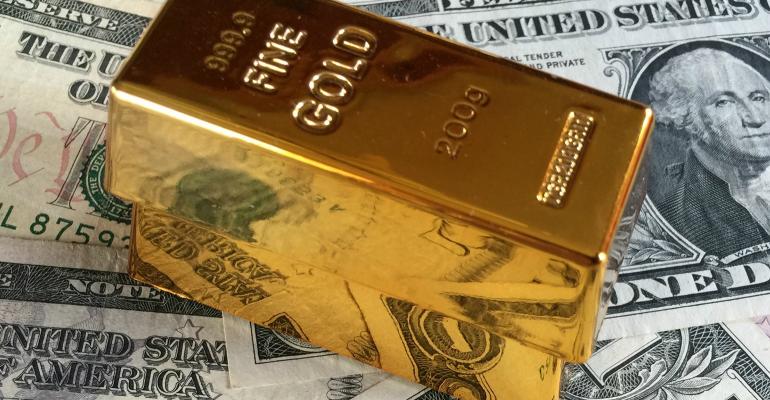By Luzi Ann Javier
(Bloomberg) --In the gold market, when the going gets tough, the tough get into cheaper exchange-traded funds.
Even in its best month since February, bullion gained only 2.2 percent in July, and concern is mounting that rising interest rates may crimp further gains. That’s helping drive investors who want to continue owning the metal toward lower-cost funds. Bullion held by SPDR Gold Shares, the largest ETF backed by the metal, have shrunk to the smallest in more than a year, while holdings in the cheaper iShares Gold Trust are near an eight-month high.
Costs that come with owning gold through ETFs are gaining more attention as bullion struggles to compete with other assets like equities that are attracting more money. Last week, Citigroup Inc. said investors should brace for price declines later this year, while BNP Paribas’s Harry Tchilinguirian, the most-accurate bullion forecaster in the second quarter, said rising interest rates will hurt the precious metal’s appeal.
“When you think we’re in an environment where real rates are rising, that’s never been a good environment for gold,” Tushar Yadava, a New York-based iShares investment strategist at BlackRock, said in a telephone interview. “If you want to hold gold as a diversifier for that period of time, you also want to make sure that you’re holding the most sensible cost basis out there.”

That’s part of the reason iShares Gold has attracted investors into its ETF at a time when its biggest rival, SPDR Gold, saw a monthly outflow of $2.4 billion in July. That was the largest redemption since 2013, when the metal was languishing in a bear market. SPDR Gold charges a fee of 40 basis points of the net asset value. IShares Gold has an expense ratio of 25 basis points.
ETF Securities Ltd., the ETF provider with the second-biggest gold holdings, runs funds backed by the metal with expense ratios ranging from 29 to 40 basis points. The ETFs are listed in Sydney, London and New York.
“With risks muted, there’s been little appetite for a potential risk-mitigation tool,” Matthew Bartolini, head of SPDR Americas Research at State Street Global Advisors, said in a telephone interview Tuesday. “As the largest gold fund, GLD is going to bear the lion’s share of that pain,” he said, referring to the company’s gold ETF by its exchange ticker.
Global demand for the precious metal fell 10 percent to 953.4 metric tons in the second quarter, a two-year low, as reduced investment in ETFs offset higher jewelry and bar purchases, according to the World Gold Council.
Gold has fallen 6.6 percent over the past year. So-called fast money accounts are flocking to equities around the world, said Sebastian Mercado, a New York-based ETF strategist at Deutsche Bank AG. Investors are chasing higher returns as Federal Reserve officials consider paring their balance sheet and raising rates. The rates outlook curbs the investment appeal of bullion, which doesn’t offer yields or dividends.
Over the past month, ETFs linked to equities tracked by Bloomberg attracted $40 billion, while fixed income got almost $17 billion. Commodities were the only asset class that posted an outflow, led by a redemption of $1.72 billion from precious metals, according to data compiled by Bloomberg. In July, SPDR Gold’s withdrawals offset inflows into iShares and other ETFs, including those backed by silver, platinum and palladium, according to data compiled by Bloomberg.
Tactical Usage
About $298 billion in SPDR Gold shares changed hands last year. SPDR Gold’s status as one of the world’s 40 most-liquid ETFs makes it a preferred bullion instrument for traders and hedge-fund managers who go in and out of markets, depending on where the short-term trading opportunities are, according to Mercado.
“When people are positive toward adding risk, there is a natural flow out of gold and Treasuries, going more into equities,” Mercado said in a telephone interview. With SPDR, “you can have more fast money coming into the product, more tactical usage, even contrarian usage, when it comes to the flows.”
That’s not the case for investors in iShares Gold, who tend to hold gold as a long-term investment, Mercado said. While iShares is liquid, with $22.3 billion changing hands last year, the ETF “doesn’t have that much short-side liquidity or fast money,” compared with SPDR, he said.
There’s much more to the outflows from SPDR Gold than just the issue of fees, SPDR’s Bartolini said.
Liquidity Advantage
“There’s really no worries,” Bartolini said in a telephone interview Tuesday. “Prices remain somewhat range-bound, and the large driver has been the risk climate. GLD is the largest because of its liquidity advantage and flows are going to move in and out. If it was expense ratio, GLD wouldn’t be as big as it is.”
The decline in SPDR Gold’s assets has slashed total holdings in all gold-backed ETFs tracked by Bloomberg to the smallest in more than four months this week. While hedge funds more than doubled their net-bullish bets on the metal in the week through July 25, they are still down by 71 percent from a year earlier, government data show.
Increased competition shrank SPDR Gold’s share of market to about 38 percent of total bullion-backed ETF holdings tracked by Bloomberg, from a peak of 74 percent in 2006. iShares slice of the pie has grown to 10.2 percent, from 6.6 percent a decade ago.
“I don’t see why tactical traders would pay more for the same thing,” said Will Rhind, the former chief executive officer of World Gold Trust Services, which created and manages SPDR Gold. “It doesn’t really make sense. The lower-priced competitor can win market share over time.”
Rhind is now the chief executive officer of GraniteShares, which offers two broad commodity ETFs that include holdings in gold futures.
To contact the reporter on this story: Luzi Ann Javier in New York at [email protected] To contact the editors responsible for this story: James Attwood at [email protected] Joe Richter





